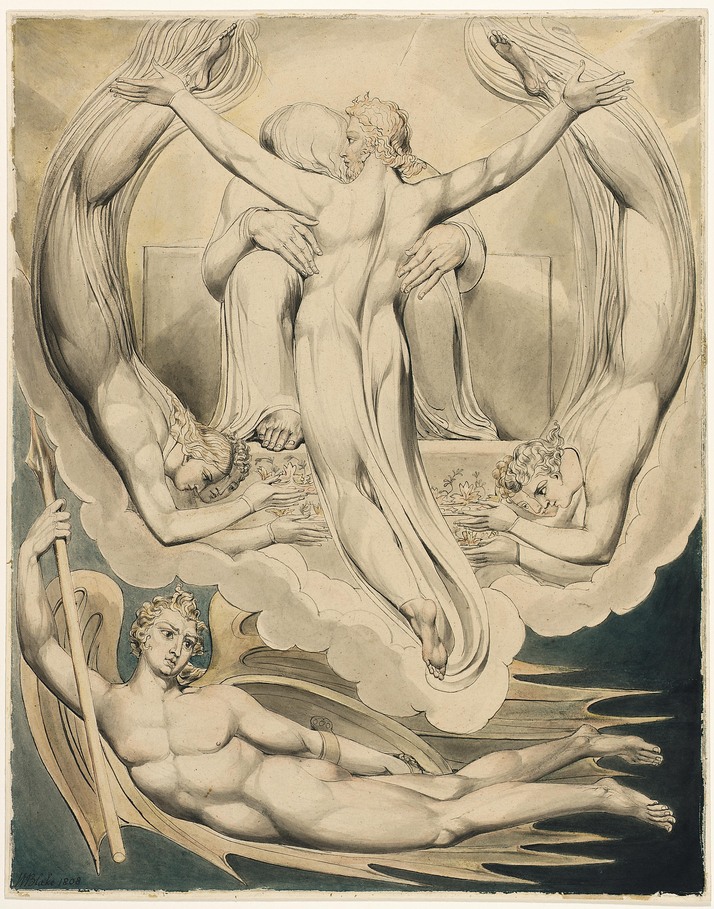Jerusalem, Plate 10, (E 153)
"Therefore Los stands in London building Golgonooza Compelling his Spectre to labours mighty; trembling in fear The Spectre weeps, but Los unmovd by tears or threats remains I must Create a System, or be enslav'd by another Mans I will not Reason & Compare: my business is to Create So Los, in fury & strength: in indignation & burning wrath Shuddring the Spectre howls. his howlings terrify the night He stamps around the Anvil, beating blows of stern despair He curses Heaven & Earth, Day & Night & Sun & Moon He curses Forest Spring & River, Desart & sandy Waste Cities & Nations, Families & Peoples, Tongues & Laws Driven to desperation by Los's terrors & threatning fears Los cries, Obey my voice & never deviate from my will And I will be merciful to thee: be thou invisible to all To whom I make thee invisible, but chief to my own Children"It's very nice when you begin to grasp the system that Blake created instead of choosing a conventional life. But the most fascinating thing is to reach some understanding of how it relates to the 'system' of the Bible.
In Joachim of Flora's Everlasting Gospel there are three stages: O.T. (the Father, who ruled by the law), N.T. (the Son where Love becomes dominant), and post-Resurrection (the Holy Spirit). Jesus told us he was leaving mortal form so that we might be led by the Holy Spirit (John 14:25-29).
Blake expressed this theory of Religion with three of his Zoas: Urizen with the Father, Luvah with the Son, and Los with the Holy Spirit. In his mind (at least part of the time) Urizen with the Fall became arrogant and thirsty for Power and chose to run the World; he always had his book before him, and he ruled by the book; he claimed to be God.
As The Four Zoas begins (with the Fall), Luvah is said to have stolen Urizen's horses of light and thereby exerted his dominance.
Four Zoas, Night I, Page 9, (E 305)
"Urizen sleeps in the porch Luvah and Vala woke & flew up from the Human Heart Into the Brain; from thence upon the pillow Vala slumber'd. And Luvah siez'd the Horses of Light, & rose into the Chariot of Day"In Blake's poetry there's much conflict between the two Zoas (psychologically - thought and feeling, or reason and impulse). This conflict occurred in Blake's psyche. In the early years freedom (free love, etc.) was dominant; in the course of his life the two functions came into (or rose to) the pre-Fall balance. (You can approximately relate this to the conflict between biblical priests and prophets; it goes on throughout the Bible. Blake definitely chose prophecy, as did Jesus - love rather than law. This accounts for the high valuation he placed on forgiveness, making it virtually synonymous with the love of God and neighbor.)
 |
| Wikipedia Commons Illustrations to Paradise Lost Page 3 |
Blake identified creative imagination with Los; Los was a blacksmith with a furnace. The Bible is full of references to a furnace: Isaiah 48:10 for example. It found expression in the hymn How Firm a Foundation.
In the Bible and in Blake there is an underlying fourfold structure. Running through it is a myth of four phases: Creation, the Fall, Redemption, and Apocalypse. This is the sequence of events in Blake's system as well as in the Bible's.
No comments:
Post a Comment